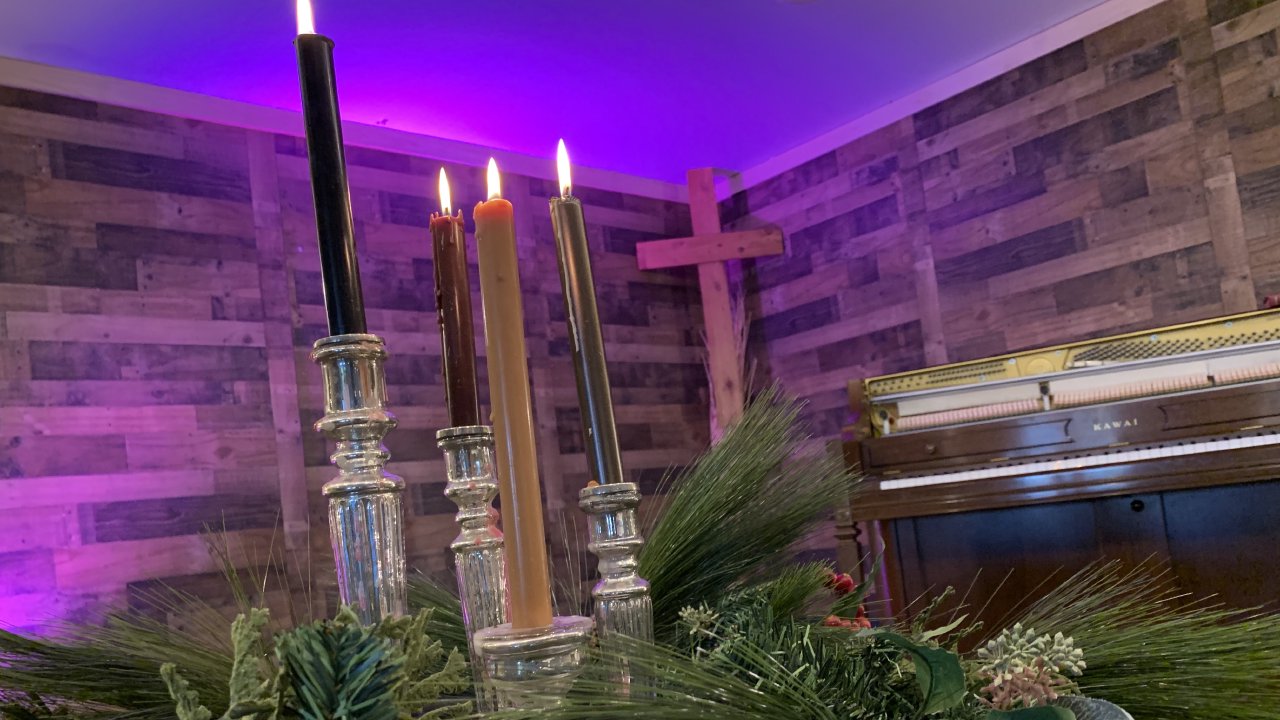DEVOTION: During His time on Earth, Jesus restored peace everywhere he went. He calmed tumultuous storms, He brought healing to the sick, He raised the dead to life, He forgave sinners their sins. Isaiah prophetically called the coming Messiah the Prince of Peace (Isaiah 9:6) and the angels announcing the birth of Jesus declared “on Earth peace to those on whom his favor rests” (Luke 2:14).
Jesus came to restore not just peace as we understand (a cessation of hostilities) but a rich, full, abiding harmony of life. His first coming began this process of restoring peace between us and God, His second coming will bring wholeness as He intended his creation to be when he first set the universe in motion.
In contrast to human history filled with war, gloom and despair the reign of Jesus will be marked by flourishing piece, holiness and delight. Isaiah 9 describes the shift from gloom and darkness to the Messianic age and Malachi describes a time when “the Son of Righteousness shall rise with healing in its wings” Malachi 4:2. Jesus rule will restore well-being to individuals and to society as a whole when He brings worldwide peace in his future Kingdom on the new Earth.
But Jesus reign of peace is not reserved for his future Kingdom, it begins here and now for all those who follow him. The Prince of peace brings us peace with God, the end of spiritual enmity and striving to secure God's favor through our good works, as well as a piece of mind and heart, a state of being at rest despite difficult circumstances because we know that God is in control. In fact, the very night that Jesus was betrayed, in his last teaching moment with his disciples, Jesus promised them peace not as the world offers it, but as only he can give them (John 14:27). No matter what would happen, they could rest and enjoy sweet fellowship with God, which would then create ripple effects in the relationships with the world around them.
We live the present reality of God's Kingdom, pushing back the kingdom of darkness and bringing to fruition the peace of Jesus. Just as He is the Prince of Peace, so He calls us to be makers of peace all around us (Matthew 5:9). Though the world may be caught up in anxiety and worry, we can rest securely in the knowledge that Jesus is making all things right and we can participate with him in bringing peace to a broken world as we look forward to the future Kingdom of peace.

Day 4, Week 3 - Jesus, The Prince of Peace
December 17, 2020 • Veronica, Melissa Richardson
Christmas Day - Jesus, Lamb of God
December 25, 2020 • Elizzabeth, Bishop Glenn Kauffman
DEVOTION: For most of Jesus disciples the word lamb would have conjured images of bloody sacrifices brought to the temple. But let's take a step back. Why would God require sacrifices in the first place? Sin requires punishment and atonement. The sacrificial system was instituted by God himself to satisfy His righteous wrath, turning it from those who deserve it to the object be in sacrificed. Think of the first sacrifice recorded in scripture, God slaughtered an animal to clothe Adam-and-Eve, covering them and their sins at the animals’ expense. We find many significant sacrifices in the Old Testament. When God tested Abraham’s love, calling him to sacrifice his own son, Isaac, Abraham assured his son that “God himself will provide the lamb for the burnt offering” Genesis 22:8. And God did provide the ram Abraham found at the top of the mountain was killed instead of Isaac. This episode foreshadowed god's provision thousands of years later through the sacrifice of Jesus. Another significant sacrifice was the Passover Lamb. After nine horrendous plagues sent upon the Egyptians in order to secure Israel's freedom, God-sent a final one, meant to kill each firstborn son. But to protect the Israelites, God instructed them to sacrifice a lamb and brush its blood on the doorposts “the blood will be a sign … when I see the blood I will pass over you” Exodus 12:13. Here, the Passover lamb points toward Jesus whose blood would cause God's wrath to pass over those covered by it. Throughout the Bible, sacrificial lambs were killed in order to bear the burdens of people sins. Sin was transferred from the guilty party to the animal. The person was declared innocent while the animal bore the sin’s just punishment: death This sacrificial system, instituted by God himself, was limited in scope: the sacrifice of atonement was required every year. But it was all meant to foreshadow Jesus. The lamb of God came to fulfill and supersede the sacrificial system. His death on the cross atoned for all of humankind’s sins once and for all, through faith in Him This is not blind forgiveness but violent justice, not cheap grace but costly grace, not temporary oversight but eternal reconciliation. God doesn't ignore our sins - he acknowledges them and makes provision for them through his own Son. The lamb of God makes possible our relationship with God CHALLENGE: Have you lost the wonder and awe of Jesus' sacrifice for your sins? Today worship Jesus for His sacrificial atonement, for taking your sins on Himself. Pick a hymn or a song that speaks of His sacrifice and sing it to Him in thankfulness.
Day 4, Week 4 - Jesus, The Man of Sorrows
December 24, 2020 • Lia, Melissa Richardson
DEVOTION: In a society that avoids pain at all cost, Jesus actions are hard to grasp. We’re surrounded by medications to relieve pain. Many turn to drugs, abortion, euthanasia in an effort to eliminate discomfort and inconveniences from life. But rather than run away from pain Jesus ran headlong into it. In the garden of Gethsemane, we glimpse the mental anguish Jesus experiences before his betrayal. He told his disciples, "my soul is overwhelmed with sorrow to the point of death" Matthew 26:38 and Luke describes Jesus distress as so intense that his sweat was like drops of blood falling to the ground Luke 22:44. Knowing full well the suffering that awaited him, Jesus pleaded with the Father to consider an alternative plan. The physical suffering, He would have to endure alone would be enough to cause any one of us to turn away, and we know enough about the Romans cruelty during crucifixions to be shaken by their brutality. But Jesus also suffered in emotional agony of being forsaken by his Father, and the spiritual anguish of bearing all the ugly inhumane horrific sins of the world on his shoulders. It was enough to make anyone want to flee in the opposite direction But Jesus knew that there was no “plan B” to satisfy God's righteous wrath. Only He could secure salvation for his beloved creatures, so He willingly accepted the hard road before him even though He did not deserve any of it: the betrayal, the mocking trial, the beating, the scorn, the humility and the torturous death through suffocation on a cross. Amazingly, Jesus had the power to stop it all with just one word, but His love for us compelled Him to step forward. He willingly walked into this His suffering, humbly allowing Himself to be ridiculed by the very ones he came to safe. Every agonizing moment he hung on the cross was another whispered “yes” to his painful course. He who commanded the universe and enjoys the worship of angels step down from heaven to despise and reject the rejected by humans. And he did it all for love.
Day 3, Week 4 - Jesus, Son of Man
December 23, 2020 • Paris, Faithful Ladep-Nandang
DEVOTION: A close study of the Gospels reveal that the most common title Jesus used for himself is the “Son of Man”. In fact, he used it 81 times in the Gospels though no one else used it to refer to Him. When the Jews heard Jesus call himself the “Son of Man”, their minds would have immediately leapt to Daniel 7. In this prophecy Daniel writes about the end times when "one like the Son of Man" will come with authority to judge the world. Jesus was claiming that title for himself and communicating to his first hearers that He has the right to judge humanity. But this title also refers to Jesus own humanity. Think of the humility Jesus endured in becoming the “Son of Man”: God eternal and magnificent “made himself nothing by taking the very nature of a servant being made in human likeness. And being found in appearance as a man, he humbled himself and became obedient to death even death on a cross” Philippians 2:7-8. Jesus emptied himself of heavenly glory while still retaining his Deity and submitted to the humiliation of becoming a human. From his position as Lord of the universe, he stooped down to become a servant, washing his disciple’s dusty feet. He set aside all his prerogatives and became like one of us, bound by time and space, trading all the riches of heaven and becoming poor in both the literal and figurative sense. This “Son of Man” was unlike any other son or daughter of man. Fully God and fully man, Jesus entered our physical existence and experience the joys and anguish of being human, yet without sin. What could possibly motivate him to do this? Love. That is the beauty of the doctrine of the incarnation God invisible, glorious and untouchable took on flesh. For us.





